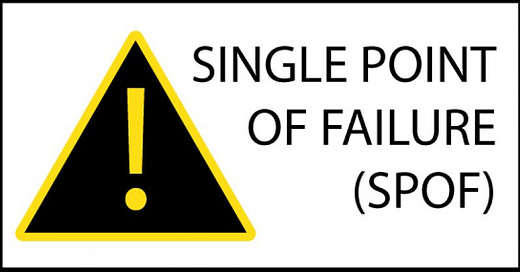A couple years back, my primary worry for our team at the EPA’s Office of Research and Development (ORD) centered on "SPOFs" – Single Points of Failure. We had, and still have, an incredible cohort of seasoned experts, many of whom were nearing a well-deserved retirement. The thought of losing even one of them, with their decades of invaluable institutional knowledge, felt like a significant risk. How do you replace the irreplaceable? That was the question that kept me, and I suspect many of my colleagues, up at night. We talked about mentorship, knowledge transfer, and succession planning, all aimed at mitigating the impact of these individual departures.
Lately, however, my concern has shifted, and frankly, deepened. While the challenge of SPOFs remains, a new, more unsettling acronym has started to form in my mind: "Mass MPOF" – or Mass Multiple Points of Failure. This isn't about the planned, albeit challenging, departure of one or two key individuals. This is about the potential for a much broader, systemic erosion of capability, driven by a confluence of pressures that seem to be weighing heavily on our dedicated federal workforce.
It’s no secret that federal service, a path many of us chose out of a genuine desire to contribute to the public good, is facing a period of significant uncertainty. We see headlines and hear discussions about shifting policies, resource constraints, and an environment that can, at times, feel less than supportive of the very people tasked with carrying out critical missions. This isn't about a single policy or a specific event, but more of a pervasive atmosphere that can lead to burnout, disillusionment, and ultimately, a desire to seek opportunities elsewhere or perhaps retire earlier than planned.
When I think about Mass MPOFs in the context of EPA ORD, the implications are sobering. We are an organization built on scientific rigor, on deep, specialized knowledge that informs decisions vital to protecting human health and the environment. This isn't just about data in a database; it's about the people who understand the nuances of that data, the historical context of environmental challenges, the intricate dance of research and policy, and the collaborative networks built over years, both within the agency and with external partners.
Imagine not just one or two experienced scientists or engineers leaving, but a significant number across various disciplines and program offices. What happens when the collective understanding of complex contaminant pathways thins out? Or when the expertise needed to rapidly respond to an environmental emergency is diminished because several key players have departed? What about the long-term research projects, the ones that require years of consistent effort and insight – how do those fare when the teams leading them experience a sudden, widespread loss of talent? This isn't just about losing individual "go-to" people; it's about the potential fracturing of the entire knowledge ecosystem. The loss isn't additive; it's potentially exponential.
The challenge of a Mass MPOF is that it’s harder to pinpoint and, perhaps, harder to address with our traditional tools. Succession planning for a few key roles is one thing; preparing for a scenario where many roles across the board become vacant, or are filled by less experienced individuals simultaneously, is a different beast altogether. It strains our capacity to mentor, to transfer knowledge effectively, and to maintain the high standards our mission demands.
So, what can we do? This isn't a call for despair, but for clear-eyed recognition and constructive action.
First, we need to acknowledge the elephant in the room: the morale and stability of the federal workforce are paramount. Creating an environment where dedicated public servants feel valued, secure, and empowered to do their best work is the most fundamental defense against a Mass MPOF. This goes beyond paychecks; it's about respect for expertise, investment in professional development, and a clear, unwavering commitment to the mission from all levels of leadership.
Second, we need to double down, and perhaps radically rethink, our approaches to knowledge management and transfer. This can't be a passive process. It requires active strategies, dedicated resources, and a culture that prioritizes sharing and collaboration. Are there innovative ways to capture and disseminate not just explicit knowledge (the "what") but also the tacit knowledge (the "how" and "why") that is so often lost when experienced personnel leave?
Third, fostering resilience within our teams is crucial. This means building in redundancies where possible, promoting cross-training, and empowering individuals at all levels to take ownership and develop their skills. A resilient organization can better withstand shocks, whether they come from individual departures or broader systemic pressures.
The shift from worrying about SPOFs to contemplating Mass MPOFs is a significant one. It reflects a change in the landscape for federal workers, particularly those in scientific and technical roles. My hope is that by naming this concern, by bringing it into the light, we can begin a more focused conversation about how to safeguard the incredible human capital within agencies like the EPA ORD. Our mission is too important to allow its foundations to quietly erode. We owe it to the public we serve, and to the dedicated professionals who show up every day, to ensure we are not just addressing the single points of failure, but the very real prospect of many.




